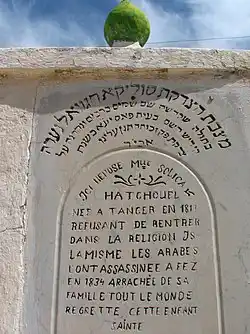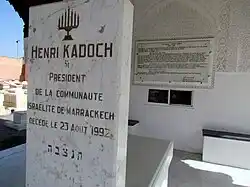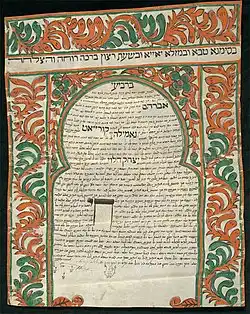
Moroccan Jewish surnames are those surnames used by Jews in what today is Morocco, as well as the Moroccan Jewish diaspora in Gibraltar, France, Israel, Canada, Venezuela, Portugal, Brazil, the USA and the Spanish cities of Ceuta and Melilla.
The presence of the Jews in the Maghreb is very ancient, with some historians debating whether the first Jews arrived after the destruction of the First Temple in the sixth century BCE or after the destruction of the Second Temple in the first century CE.[1] The Jewish community of Ifrane, known by the Jews as Oufrane, is believed to be the oldest Jewish community in the Maghreb, dating back to 361 BCE according to some records.[1] However, this title is disputed with the Berber-Roman city of Volubilis, near the northern city of Meknes, where tombstones written in Hebrew, the most unquestionable proof of Jewish presence, have been found and they are estimated to be from the 3rd-century CE.[2]
The First Jews that arrived from the Iberian Peninsula were fleeing persecution by the Visigoths in the 7th century. However, with the Arab conquest of the Maghreb, many more Jews came as traders and settled. They generally prospered during the Idrisids and the Almoravids, were very limited during the reign of the Almohads, and slowly were allowed to develop under the rule of the Marinids. It is believed however, that the Marinid period is when the most Jewish conversions to Islam took place, not just as a consequence of the pogroms in 1465,[3] but also the search for social mobility; that is, to free themselves from their dhimmi status and to obtain roles in the civil and military administration.

However, the numerically largest and most influential Jewish immigration to Morocco took place after the expulsion of the Jews from the Iberian Peninsula, following the Alhambra Decree in 1492. This was the culmination of a process that began during several pogroms in the late 14th century and which resulted in the conversion to Catholicism of around 200,000 Jews and the expulsion of nearly 100,000.
After the expulsion of the Jews from Spain and later from Portugal in 1496, the mass arrival of Iberian Jews caused enormous changes in the Jewish community of Morocco. The newly arrived, and generally more affluent, rūmiyīn ("Europeans", in Arabic) took the positions of power in the community to the detriment of the local, poorer forasteros, or "foreigners" in Spanish.[4] Later, New Christians managed to leave Spain and Portugal and arrived in Morocco, where they returned to their original faith.[5][6] While these socio-economic and religious differences generated rejection among the long-established local community for centuries, eventually the Spanish religious tradition became dominant while keeping a distinctive Maghrebi influence.[7]
History of Moroccan Jewish surnamesHistory of Moroccan Jewish surnames
Before the arrival of the Jewish refugees from Spain at the end of the 15th century, only a few Moroccan Jews used hereditary surnames. The earliest references to surnames are from the early 12th century, roughly 300 years after the Arabic conquest of Morocco. The best-known examples of those ancient surnames are L'Mdioni (known as El Medioni in Spanish) and Bahlul.[8] However, until the arrival of the Iberian Jews, surnames were uncommon. When the Spanish expellees settled in the Maghreb, the custom of carrying a hereditary surname became slowly more common. The custom reached its peak with the rising European influence in the 1800s, promoted by institutions like the Alliance Israélite Universelle.
Moroccan Jewish naming conventionsMoroccan Jewish naming conventions
Due to the fact that Moroccan Jews lived under regimes with different official languages, some Moroccan Jewish surnames tend to be spelled differently depending on the language of the registrar, be it Arabic, French, Spanish or Hebrew. Applying the language conventions of the respective language to the way the surnames are written causes some surnames to have up to four different spellings. For example:
- M'loul/Melloul/Melul/Malul
- Botbol/Abitbol/Abutbul/Boutboul
- Shukrun/Chekroun/Chokroun/Chocrón
- Bittan/Bitton/Biton
- Vaknin/Ouaknine/Akinin/Oiknine
While this is an important aspect to take into account when researching Moroccan Jewish surnames, the MyHeritage technology available in SuperSearch covers all the different spelling variants and similar-sounding surnames, saving precious time for the researchers.
Moroccan Jewish surnames of patronymic originMoroccan Jewish surnames of patronymic origin
The best-known Moroccan Jewish surnames are those of patronymic origin and all start with the Ben- prefix, meaning "son of" in both Arabic and Hebrew; depending on the language of the registrar, the prefix can be joint, hyphenated or separated, like Benguiui, Ben-Attar or Ben Shushan. Other common patronymic Moroccan Jewish surnames are:
A minority may begin with Abe- or "Abu-", like Abecassis, Aboulafia and Abouhatzeira.
Moroccan Jewish surnames of occupational originMoroccan Jewish surnames of occupational origin
A significant number of Moroccan Jewish surnames are related to occupations, with the name of the occupation in most cases being taken from Maghrebi Arabic instead of Classical Arabic. Among the most common Moroccan Jewish surnames associated with an occupation are:
- Assal ("beekeeper")
- Benacerraf ("son of the money changer")
- Sebag ("dyer")
- Siboni ("soap maker")
- Attal ("porter")[9]
- Abecassis ("storyteller")
- Elharar ("liberator")[10]
- Fitoussi – linked to culinary roles or oil pressing
- Serero – possibly a weaver or textile worker
- Ben Attar – "Son of the Spice merchant"
- Turdjman – "Interpreter"
Moroccan Jewish surnames of toponymic originMoroccan Jewish surnames of toponymic origin
Some Moroccan Jewish surnames can indicate a toponymic origin and include the Arabic and Hebrew toponymic ending -i, such as:
Moroccan Jewish surnames of descriptive originMoroccan Jewish surnames of descriptive origin
Most of the Moroccan Jewish surnames that are associated with physical characteristics, personal traits or attributes that can be associated with animals are of Arabic origin, like the following:
Moroccan Jewish surnames of Hebrew originMoroccan Jewish surnames of Hebrew origin

Most of the Moroccan Jewish names of Hebrew origin are associated with religious activities or roles, as in:
- Botbol (the Hebrew root ט.ב.ל means "purification in a ritual bath")
- Azoulay (an acronym of the biblical restriction on whom a Kohen may be able to marry)
- Gabbay (the word in Aramaic for the person who assists in the running of synagogue services)
- Kadosh ("holy")
- Hayyim ("life")
- Elkayam ("God is alive")
- Amsalem – "peaceful one"
- Malka – "queen"
- Nahon – from nachum, "consolation"
As in most Jewish communities, the surnames Cohen and Levi are commonly found as well.
Moroccan Jewish surnames based on a given name or surnameMoroccan Jewish surnames based on a given name or surname
A few Jews in Morocco took surnames derived from common Arabic given names or even surnames, like Younès (the vernacular pronunciation of Yûnus), Avrahami and Mimoun;[10] the latter is a common Moroccan Jewish given name, with its best-known bearer being the father of Maimonides, who referred to himself as "Moses, son of Rabbi Maimon the Spaniard".
Moroccan Jewish surnames of Amazigh originMoroccan Jewish surnames of Amazigh origin

Some historians have written two theories about the so-called Berber Jews. One is that numerous Berber tribes converted to Judaism before the Arabic invasion of the Maghreb in the 8th century, while others propose that some small (albeit geographically widespread) Amazigh communities converted to Judaism long after the arrival of Islam. This was especially true in remote areas away from the main centers of power, where instead of assimilating into the Sephardic mainstream, they developed their own customs.
Regardless of the validity of either, there are a vast number of surnames of Amazigh origin,[10] with most of them being of toponymic origin based on the name of a Berber tribe or Berber-inhabited town, like:
A minority of the Moroccan Jewish surnames of Amazigh origin can be of descriptive origins, like:
- Azeroual (blue-eyed)
- Melul (white, brilliant)
- Eizenkot (deer)
- Amzaleg (agent)
- Amoyal (singer, choir)
- Assouline (from asulil , "rock")
Some may also be patronymic, all starting with the Amazigh patronymic -o, which in French may take the form -ou and the form -gu in Spanish:
Many of the Moroccan Jewish surnames of Amazigh origin can be found among non-Jewish families as well, either hinting at conversion to Islam from Judaism or the other way around after the surname was established. However, a few surnames of Amazigh origin have been found only with bearers of Jewish origin:
Moroccan Jewish surnames of Spanish originMoroccan Jewish surnames of Spanish origin
See also: Sephardic Jewish surnames
A significant number of Moroccan Jewish surnames correspond to surnames of Romance origin brought by Spanish Jewish refugees to North Africa, which redefined the community's customs over the course of 500 years after their expulsion from the Iberian Peninsula. With them, the Spanish Jews (known as Sefaradim, "from Spain") brought with them the use of surnames, a custom that was already established back in the 12th century. Some of the most common Moroccan Jewish surnames of Spanish origin are:
Celebrities of Moroccan Jewish originCelebrities of Moroccan Jewish origin

- Emmanuelle Chriqi, Canadian actress
- Shlomo Moshe Amar, Chief Rabbi of Jerusalem and former Sephardic Chief Rabbi of Israel
- Baruj Benacerraf, Venezuelan physician, Nobel Prize for Medicine in 1980
- David Guetta, French DJ and music producer
- Ronit Yashar (born Elkabetz), Israeli actress
- André Azoulay, senior advisor to the King of Morocco
See alsoSee also
- Sephardic Jewish ethnicity
- Sephardic Jewish surnames
- Russian Jewish surnames
- Hebrew surnames
- Jewish surnames
- Yemenite Jewish surnames
- Macedonian Jewish surnames
- Serbian Jewish surnames
- Mountain Jewish surnames
- Arabic surnames
- Middle Eastern surnames
- North African surnames
- Spanish surnames
- Portuguese surnames
- French surnames
Explore more about Moroccan Jewish surnamesExplore more about Moroccan Jewish surnames
- Last names on MyHeritage
- Historical records from Israel on MyHeritage
- Jewish Ethnicity & DNA: History, Migration, Genetics at Legacy Family Tree Webinars
References
- ↑ 1.0 1.1 Gottreich, Emily. Jewish Morocco: A History from Pre-Islamic to Postcolonial Times. Bloomsbury Publishing. London, 2020. Bloomsbury Publishing. ISBN 978-1-7807-6849-6
- ↑ Andreeva, Sofia; Fedorchuk, Artem; Nosonovsky, Michael. Revisiting Epigraphic Evidence of the Oldest Synagogue in Morocco in Volubilis
- ↑ Abd al-Basit b. Khalil, "al-Rawd al-Basim." Deux recits de voyage inedits en Afrique du Nord au XV siècle, Abdalbasit b Halil et Adorne. (Paris, 1936), quoted in Stillman, Jews of Arab Lands, 281-286.
- ↑ Bürki, Yvette. Haketia in Morocco. Or, the story of the decline of an idiom. International Journal of the Sociology of Language, 2016. ISSN 0165-2516
- ↑ Kayserling, Meyer (1865). Geschichte der Juden in Portugal [History of the Jews in Portugal] (in German). Berlin.
- ↑ Taieb-Carlen, Sarah. The Jews of North Africa: From Dido to De Gaulle. University Press of America, 2010. ISBN 978-0-7618-5044-1.
- ↑ Schroeter, Daniel; Abécassis, Frédéric; Aouad, Rita; Dirèche, Karima. "Identity and nation: Jewish migrations and inter-community relations in the colonial Maghreb", La bienvenue et l’adieu| 1: Migrants juifs et musulmans au Maghreb (XVe-XXe siècle), Description du Maghreb, Centre Jacques-Berque, 2012. ISBN 9782811106065
- ↑ JeanSchaub, -Frédéric. Les Juifs du roi d'Espagne (Oran 1509-1669), Paris, Hachette Littératures, 1999.
- ↑ Laurent Hertz, Dictionnaire étymologique de noms de famille français d'origine étrangère, L'Harmattan, 1997, p.88
- ↑ 10.0 10.1 10.2 10.3 10.4 10.5 10.6 Beider, Alexander. Jews of Berber Origin: Myth or Reality?. Hamsa - Journal of Judaic and Islamic studies. 2017
- ↑ The meaning of the names of Moroccan jews. Dafina.net
- ↑ Gilad, Elon What Does Your Jewish Name Mean?. Haaretz. April 22, 2014
- ↑ Coriat surname. Geni.com
- ↑ Otro Significado de Chocron

